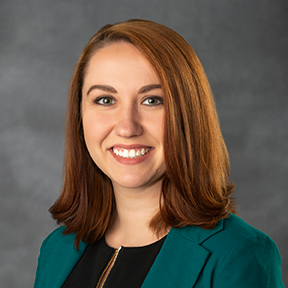Ph.D. student Leah Bouchard earns prestigious rural health fellowship
Growing up in rural western North Carolina, Leah Bouchard saw the impact of methamphetamine and opioids on the members of her small community.

First as a multi-systemic therapist in eastern Tennessee and then as a doctoral student and candidate at the VCU School of Social Work, she has dedicated both practice and research to serving communities and youth – particularly marginalized youth – dealing with substance misuse.
And now her commitment and expertise have been recognized with a prestigious fellowship from the National Rural Health Association. Only one social worker has been selected among 31 fellows from the previous two classes.
“I’m excited to be a social worker in this space and to apply a social justice lens to the public health issues rural communities face, and to emphasize the issue of rural youth opioid use,” Bouchard says. “Particularly, I’m excited to spend time in the fellowship learning how to better advocate for youth belonging to marginalized populations within rural areas.
“Often, marginalized youth are at greater risk for opioid and other substance misuse, and experience more severe consequences of misuse. I want my work to serve not just rural communities, but the youth who experience these health disparities more profoundly because of the intersection of their rural identity and other marginalized identities they may hold.
“During my time at VCU, I have sought to amplify rural voices and experiences through my research. I’m excited to provide a social work lens to this work while also learning from those serving as practitioners and healthcare providers in rural areas.”
The 12-month fellowship will begin in 2022 and will provide conferences for training and networking, as well as monthly conference calls and a role on an action project team. The fellows program seeks to build leadership that can serve in the NRHA, affiliated advocacy groups and governance bodies.
“Through this fellowship, NRHA is recognizing Leah as a rising leader in research on rural health disparities, and it is a well-deserved honor,” says her dissertation advisor, Associate Professor Traci Wike, Ph.D. “She is a passionate advocate for rural communities, and her work will advance the knowledge on opioid misuse prevention strategies among rural youth and their caregivers. Findings from her research have the potential to influence practice, research and policy, resulting in needed change for rural communities. It is exciting to see her hard work reach a national audience of leaders in rural health.”
Adolescents are extraordinarily vulnerable to the impact of this epidemic, and this vulnerability is magnified for rural youth who hold other marginalized identities (e.g., rural youth of color, rural LGBTQ+ youth).
Bouchard says rural communities have higher rates of substance misuse, incidence of overdose and greater frequency of opioid prescriptions than non-rural communities. Geographically isolated and often facing community-wide poverty, the communities lack resources and prevention/intervention support to address opioid misuse.
“Rural communities have experienced the brunt of the opioid epidemic,” she says. “Rural community members are often unable to access the help they need when experiencing their own misuse or the misuse of someone in their family.”
Adolescents who have grown up in the opioid epidemic have seen its impact shape their community and create barriers and struggles they face into adulthood. The developing brain structure of adolescents puts them at increased risk for substance experimentation and addiction, Bouchard says, compounded by disparities rural communities face.
“Adolescents are extraordinarily vulnerable to the impact of this epidemic, and this vulnerability is magnified for rural youth who hold other marginalized identities (e.g., rural youth of color, rural LGBTQ+ youth),” she says.
Rural communities are strong, Bouchard points out, and can be empowered for sustainable change with the right supports: appropriate resources, rural-centric prevention efforts and rural cultural competence in both education and practice.
“The ability to do so lies in the existing strength and cohesion of rural people and their communities,” she says.
Bouchard’s post-graduate aspirations align perfectly with the NRHA’s goals for fellows.
“Going forward, I intend to serve as university faculty to continue community- and practice-driven research, advocate for these communities at the local and national level, and train new cohorts of social workers to better serve rural people,” she says. “Ultimately, I hope to use my work and position to continue to lift up rural communities like the one that raised me and make sure they have the tools they need to thrive.”
Categories Awards and honors, Community, Education, Research, Students